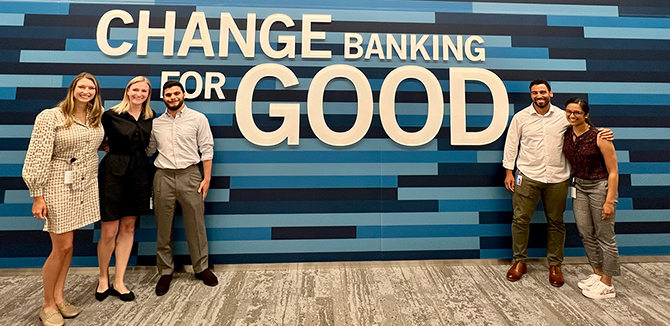Capital One’s MMM Five
A quintet of summer interns brought the program’s human-centered design approach to the financial institution.

Capital One was a bit of a MMM extension this summer as five students from the dual-degree program between Northwestern Engineering and the Kellogg School of Management interned with the bank holding company.
The MMM students — Preeya D'Mello (MMM '24), Sophie Erhardt (MMM '24), Tyler Hamilton (MMM '24), Kerri Hemmelgarn (MMM '24), and Jason Ippolito (MMM '24) — made up one quarter of the company's summer MBA interns.
“It was so great to have such a tight-knit group that I could rely on over the summer,” Hamilton said. “It was a great group to lean into when I was unsure what to do next.”
An internship is a MMM requirement that comes at the end of students’ first year.
The five MMM students working at Capital One assisted on a variety of projects for the company that specializes in credit cards, auto loans, banking, and savings accounts. While their specific responsibilities varied, all of their projects shared one aspect – an intense focus on human-centered design.
“Capital One’s product organization has adopted a lot of human-centered design approaches,” said Erhardt, who credited the MMM program with preparing her for her internship experience. “MMM’s focus on human-centered design as the foundation for innovating really appealed to me and was the perfect complement to the more traditional skills I could build through an MBA.”
Human-centered design is at the core of the MMM program. The principle holds that the best way to create truly useful and needed products is to focus intently on the end-user. The five students did just that at Capital One, spending much of their summers interviewing end-users for both internal technological improvements and external product offerings.
Hemmelgarn said having the right mindset of curiosity and empathy is crucial for human-centered design to be effective.
“There are lots of times where I was surprised by what someone said in a customer interview because I had made assumptions,” she said. “Being open-minded allows us to discover the deeper problems we didn’t know existed before.”
The problems the interns tackled this summer included:
- Projects related to modernizing Capital One’s core system
- Modernizing the company’s core system that processes all its transactions, authorizations, and customer data.
- Creating recommendations for the product team to measure how different features contribute to customer loyalty.
- Developing the company’s Enterprise Feature Platform product to break through barriers that prevent its data scientists from using it most effectively.
All the interns credited the MMM program with giving them the tools they needed to find success. Most notably, they pointed to the program’s Research, Design, and Build course. That hands-on class challenges students to address real business problems through the human-centered design lens they are learning in the program.
“RDB was incredibly useful in my time during the internship,” Hamilton said. “I didn’t realize at the time I took the course how impactful that class would actually be.”
The interns said their summer experience helped them hone their focus for the rest of their time in the MMM program and sharpen their post-graduation career plans.
Erhardt, for example, said her internship confirmed that product management is where she wants to work once she earns her degree. Hemmelgarn said her experience narrowed her target to a product management career in the technology industry.
But, Hemmelgarn said, what she’s learning in the MMM program extends beyond her chosen field.
“Design thinking can be applied to so many different roles and industries, not just technology,” she said. “I think the lessons learned in MMM will serve me beyond my career in product management.”
